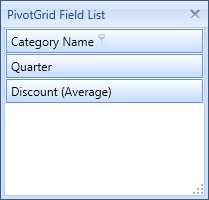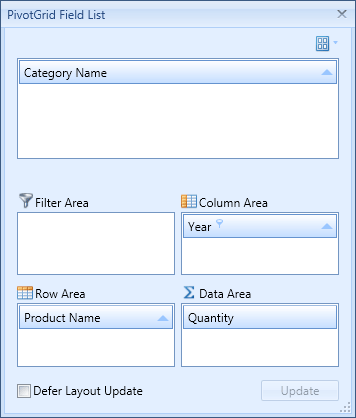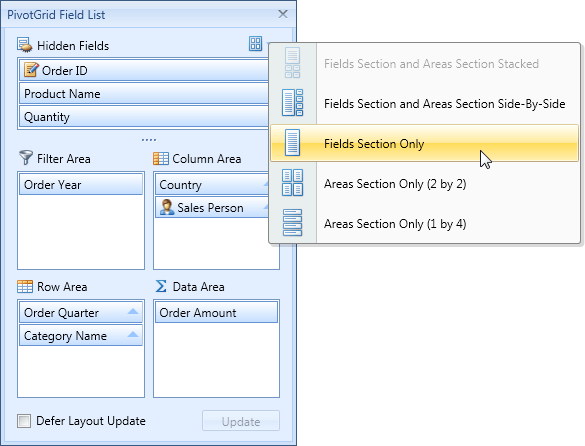Customization Form Styles
- 3 minutes to read
The Customization Form can be painted in two styles: Simple and Excel 2007. A style defines the Customization Form layout and the capabilities available for end-users.
Use the PivotGridControl.FieldListStyle property to specify the required style.
Simple Style
A simple-style Customization Form displays hidden fields by default.

End users can hide visible fields by dragging and dropping them onto the Customization Form, and return hidden fields to the pivot report by dropping them onto appropriate Header Areas. When end users move fields to the Customization Form, the field’s visibility is changed, but the field’s area remains unchanged.
If the PivotGridControl.FieldListIncludeVisibleFields property (PivotFieldListControl.IncludeVisibleFields for standalone Customization Forms) is set to true, a simple-style Customization Form displays visible fields together with hidden ones. In this instance, a check box is shown near each field allowing you to show or hide this field.
Excel 2007 Style
An Excel-style Customization Form contains a section where hidden fields are displayed and four more sections that display visible fields located in the Column, Data, Filter and Row areas.

Similarly to a simple-style Customization Form, end users can hide visible fields by dragging and dropping them into the Hidden Fields section and return hidden fields to the pivot report by dropping them onto appropriate Header Areas.
The following are additional capabilities provided exclusively by the Excel-style Customization Form.
- Move a field to a specific area by dragging its header between the Customization Form’s area boxes.
- Delay layout updates. First, check the Defer Layout Update check box, then drag fields between the areas and click the Update button to apply changes.
Sort and filter data. You can toggle the sort order of fields by clicking their headers in the Customization Form and invoke filter popup windows via the filter buttons.
Use the PivotGridControl.AllowSortInFieldList and PivotGridControl.AllowFilterInFieldList properties to specify whether end users are allowed to perform sorting and filtering in the Customization Form.
End-users can change the Customization Form layout via a popup menu.

You can prevent end users from selecting particular layouts by listing all the allowed layouts via the PivotGridControl.FieldListAllowedLayouts property.
To specify a layout in code, use the PivotGridControl.FieldListLayout property.
If the PivotGridControl.FieldListIncludeVisibleFields property (PivotExcelFieldListControl.IncludeVisibleFields for standalone Customization Forms) is set to true, a simple-style Hidden Fields section displays visible fields together with hidden ones. In this instance, a check box is shown near each field allowing you to show or hide this field.